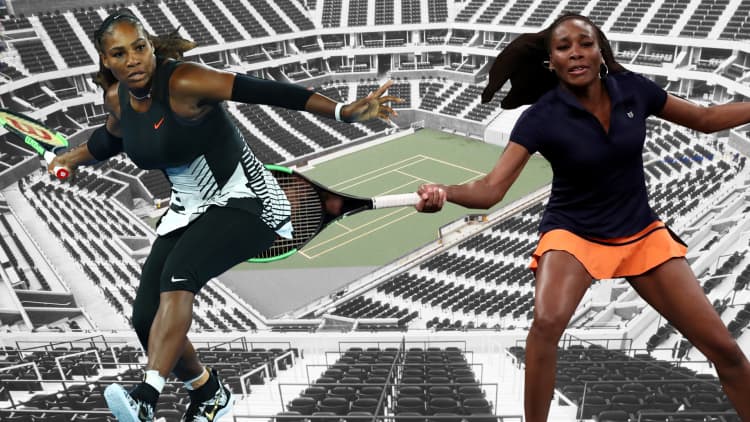Tobin Heath and Christen Press are both world-class professional soccer players, playing for the U.S. Women's National Soccer Team as well as for club teams in the National Women's Soccer League — Press for Utah Royals FC and Heath for the Portland Thorns.
But despite being among the best in the world at their jobs, soccer is not their primary source of income.
"We don't make enough in our job to live the way that we would want to and to have the support that we would need," says Heath. "Most of our income doesn't even come from our salary from our employer and we have to find income from other places. And it's this weird dynamic that has happened where our employer isn't held accountable for actually paying us our worth, therefore we have to go out and find our worth in other places."
The teammates spoke with CNBC Make It about why they have been forced to be more than just athletes — and why it has been a blessing in disguise.
Supplementing their salaries
In March of 2019, 28 members of the USWNT (including Heath and Press) filed a lawsuit against the U.S. Soccer Federation (USSF) for gender discrimination and unequal pay and sought more than $66 million in damages.
In May, a federal judge in California ruled against the players on claims of pay discrimination, and the team is attempting to appeal the decision.
CNBC Make It reached out to the USSF for comment, but did not receive a formal statement. A USSF representative denied that the organization treats members of the USWNT inequitably.
As the team fights for equal pay, USWNT players have worked with companies to help close what they say is a pay gap.
In April 2019 LUNA Bar announced that it would pay the 23 members of the USWNT roster $31,250 to cover the disparity between the bonuses paid to the women and men's teams in honor of Equal Pay Day.
In July 2019, two days after the USWNT won the 2019 World Cup, insurance company Allstate announced a multi-year partnership with the team to become the group's presenting sponsor of the team's victory tour.
Over the years, UWNT members have taken on countless brand partnerships, social media sponsorships and modeling opportunities to help supplement their salaries.
In fact, Health and Press spoke for the purpose of this article as representatives for Frito Lay's pita chip brand Stacy's — a company that was founded in the 1990s by a woman, Stacy Madison, and that recently awarded 15 women $10,000 business grants as a part of it's Stacy's Rise Project.
While the two say they are grateful to have the opportunity to work with brands they support, they admit that it can be disappointing that they can't always focus on their main jobs as athletes.
"This has frustrated me personally, as a football player," says Heath. "It can be exhausting. It can be infuriating. But in a way, it also can be extremely rewarding."
'Maybe everyone should just be held to a higher standard'
In 2015, Heath and Press began building a business of their own alongside teammates Megan Rapinoe and Meghan Klingenberg.
"It all started after we won the 2015 World Cup and we came home to the most amazing reception and celebration and we were all blown away by how much people cared about what we did and what we were doing as powerful female athletes but that was juxtaposed against how we were treated and paid by our employers," says Press, explaining her frustration with organizations that she says see resources as "zero-sum."
She continues, "The four of us said we will continue to fight for better treatment with the national team, and that has been a huge part of the last five years, but along with that we wanted to fight for something and we wanted to create a new pie where we created value and could invest in ourselves."
The result was re—inc, a direct-to-consumer lifestyle brand that aims to be more than just a lifestyle brand — from championing gender equity by designing gender-neutral clothing to combating systemic racism by producing product lines that support organizations such as Black Visions Collective.
In this way, the athletes have held their business to high standards. Not only do they expect their business to run smoothly, but they also have big expectations for how to operate as a purpose-led, socially conscious business that "re-imagines the status-quo in everything they do."
In part because of their high standards, re—inc clothing carries a higher price-point. For instance, the organization sold joggers for $150 and currently sells t-shirts for $75.
Researchers at Yale University have raised concerns that women and girls are conditioned to be more altruistic, while men and boys are encouraged to be more selfish. And in business, this double standard in which women are expected to be altruistic entrepreneurs focused on more than just profit could put their businesses at a disadvantage.
"There's a complexity there because there shouldn't be double standards," says Press. "But at the same time, maybe everyone should just be held to a higher standard because we need altruism and we need to be building companies that care about society, sustainability and taking care of the community."
And Heath says that ultimately being "more," as athletes and as business owners, has forced them to be better on and off the field.
"As much as I just want to be paid for being a professional athlete, because that's what I do, being more is a beautiful thing," she says.
Don't miss:



